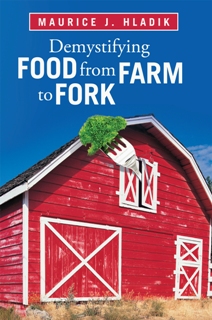Guest Speaker: The Organic Food Controversy—Challenging Nutrition, Flavor and Sustainability
02 October 2012
 According to the author of a new book, Demystifying Food from Farm to Fork, the benefits of organic foods are not justified by their cost.
According to the author of a new book, Demystifying Food from Farm to Fork, the benefits of organic foods are not justified by their cost.
By Maurice Hladik
In 2009, the American Journal of Clinical Nutrition published a similar report, Nutritional Quality of Organic Foods: a Systematic Review, which reached a similar conclusion. The later research was conducted by the University of London on behalf of the British government. Both these were meta-analyses, meaning the highly qualified teams gathered numerous research papers on both sides of the argument before concluding that when it comes to nutrition, farming is farming. The approaches by organic farmers, which differ from their conventional brethren, had little or no impact on nutrition.
These results are hardly surprising when one considers that nutrition is dependent on a host of issues, starting with the variety of the plant or animal. For example, hard red spring wheat has higher protein content than soft winter wheat, and Jersey cows tend to produce milk with higher butterfat content than black and white Holstein Friesians. Then there are a slew of other factors, including the maturity of whatever is grown at harvest, length of time in storage, the variables of humidity and conditions in transport, plus many more. Whew! With so many factors influencing nutrition, it isn’t surprising that a handful of farming practices would make little difference.
The Stanford paper does point out that while both types of food contain chemical residues, the likelihood of encountering them on organic products is less than the conventional option. However, all foods were within minimal safety levels when it came to toxicity exposure.
Understandably, the proponents of organic foods wish to protect their brand and find fault with the methodology of these two reports, but do not seem to make any serious attempt to muster the evidence to counter these conclusions. Others point out that organic is more than nutrition, but encompasses such important factors as flavor benefits for consumers and sustainability back on the farm.

I am not so certain that organic farming is particularly sustainable. Most science-based yield studies in Canadaand the United States have organic output per acre averaging about 75% that of “conventional” agriculture. If organic farming ever became mainstream (US Census data has less than 1% of farmers and also farmland dedicated to the practice), either a lot of people would go hungry or substantially more rainforest would be in jeopardy. Using more land to feed the world seems to be the antithesis of sustainability.
The oft-quoted exception to the yield data is the Rodale Farm Systems Trial, which defies logic. This website maintains that organic production methods, while using 45% less energy and reduced inputs in general, still out yields conventional agriculture. Given a reported three times the profit per acre for organic, why have not the 99% of conventional farmers who are always seeking best practices to reduce inputs and boost yields along with profits embraced this approach to farming? These guys and gals are not stupid; perhaps there is a bit of “leg pulling” going on at Rodale.
Regarding flavor, the same factors that impact nutrition are also at play here. While it is a nice assumption that organic food tastes better, there is little science to back up this concept. At a workshop where I was presenting on food, I conducted a double-blind comparison between delicious organic and non-organic apples, bananas and baby carrots. I performed this experiment so I could participate without knowing which produce was organic or otherwise. The results: 60%, including me, chose the organic apple as tastier. Regarding the bananas, there was the unanimous consent that there was no difference. For the baby carrots, 100% chose the conventional. Upon inspection of the packages, it was determined that the “best by” date was close at hand for the organic carrots, while the conventional product had probably just been stocked. While the organic carrots might have started out tastier, the length of time at the point of purchase trumped any advantage that the organic farmer might have contributed to flavor.
While the sample was small (15 participants) and this hardly counts as serious science, those in the experiment, including organic food supporters, all agreed that the evidence presented that day was not very convincing regarding the flavor benefits of organic.
Bottom Line: For consumers convinced that organic is better, by all means maintain your allegiance. For those consumers who may appreciate the lower cost of conventional food, you do not seem to be compromising nutrition or flavor at the dinner table.
Maurice J. Hladik grew up on a farm in western Canada and was an active farmer into his early adult years. He earned two degrees in agricultural economics from Canadian and U.S. universities before becoming an agricultural diplomat in New Zealand, Germany, China, Thailand and South Korea. He also served a decade in the private sector as an executive of an agriculture-based company with an international reach. For info on his new book, Demystifying Food from Farm to Fork, visit http://foodfarmfork.authorsxpress.com.
Additional Info
- CAFÉ Talks Podcast Lesson Plan: 8
